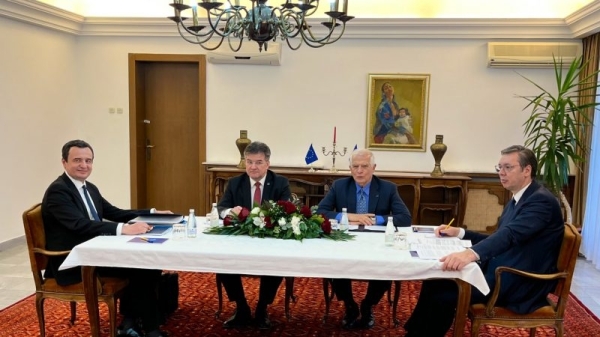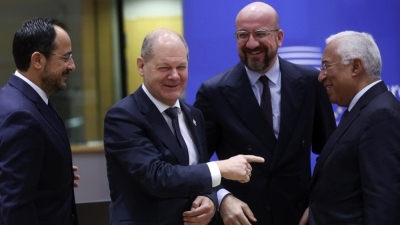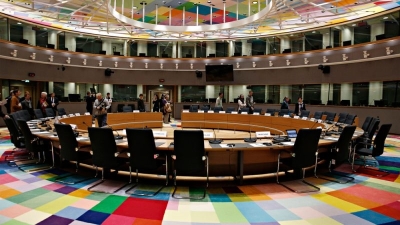Serbia, Kosovo ‘gentlemen’s agreement’ on EU-backed deal unpacked

While Kosovo and Serbia reached a verbal agreement on implementing an EU-backed deal to normalise ties over the weekend, disagreements and a lack of clarity over what shape some provisions will take, remain.
Belgrade and Pristina have been in EU-backed talks since 2011, three years after Kosovo declared independence in 2008 following the 1998-1999 Kosovo-Serbia war.
But Serbia still regards Kosovo as a breakaway province, and flare-ups between the Balkan neighbours over the years, intensifying in 2022, stoked fears of a return to conflict.
The agreement on Saturday (18 March) came after 12-hour talks between Kosovo Prime Minister Albin Kurti, Serbian President Aleksandar Vucic and EU officials on implementing the deal, which both sides had verbally agreed to in Brussels last month.
Last month’s 11-point plan says that Serbia and Kosovo are obliged to develop normal, good-neighbourly relations as well as to respect their independence and territorial integrity.
The text does not explicitly mention recognition but indicates de-facto recognition by saying that the two sides should exchange permanent missions, which will be established at the respective government’s seat.
It further says that Belgrade should not object to Kosovo’s membership in any international organisations.
‘Gentlemen’s agreement’
At the meeting in Ohrid, North Macedonia, no document was signed and the EU said it had wanted to go further.
While Pristina committed to more autonomy for Serb-majority areas and Belgrade agreed not to block Kosovo’s membership in international organisations, the EU’s chief diplomat Josep Borrell said the agreement had fallen short of a “more ambitious and detailed” EU proposal that the parties were unable to agree on.
“The parties could not find a mutually acceptable solution as ambitious as the one we proposed ,” Borrell said.
Borrell said Kosovo had lacked flexibility on substance, while Serbia had refused to sign the document although Belgrade said it was “fully ready to implement” it.
He also added that the EU will now forcefully demand both sides to fulfil obligations if they want to join the bloc, warning there would be consequences otherwise.
“The parties have fully committed to honour all articles of the agreement and implement their respective obligations expediently and in good faith,” Borrell tweeted, later clarifying that both annex and agreement are considered adopted through his statement.
The implementation annex is meant to become an integral and binding part of the respective European paths of the two countries, he added.
Nevertheless, questions about enforcement remain.
Unpacking the annex
In the annex on the implementation of the agreement, published by the EU’s diplomatic service on Saturday evening, the parties agreed to set up a Joint Monitoring Committee, chaired by the EU, within 30 days.
EU senior officials had told reporters earlier last month such a mechanism would include more regular reporting to member states on the progress of implementation, compared to previous agreements.
One of the most contentious issues in the talks was the creation of the Association of Serb Municipalities in Kosovo.
“Kosovo has agreed to launch immediately – and when I am saying immediately, I mean immediately – negotiations with the EU facilitated dialogue on establishing a specific arrangement and guarantees to ensure an appropriate level of self-management for the Serbian communities in Kosovo,” Borrell said on Saturday.
The approach of “two Germanies”, which has been promoted as a suitable model over the past years, according to which both would act as separate entities but don’t recognise each other and not impede the existence of one another, seems not to be an option.
As EU member hopefuls, both countries have been told they must first mend their relations.
“Kosovo and Serbia recognise that any failure to honour their obligations from the Agreement, this Annex or the past Dialogue Agreements may have direct negative consequences for their respective EU accession processes and the financial aid they receive from the EU,” the annex states.
Commitments will be integrated and required within the framework of current EU accession negotiations with Belgrade and will be added to Chapter 35 of the country’s acquis.
It will also be taken on by Kosovo’s Special Group on Normalisation, which submitted its bid for candidate status in December.
The step seemingly neutralises the lack of signature but also the need of having it to be ratified in their respective parliaments, an EU source said.
However, some experts say this should go hand-in-hand with a change of status by the five non-recognisers of Kosovo – Cyprus, Greece, Spain, Romania, and Slovakia – to present a real incentive.
“No disbursement will happen before the EU determines that all provisions of the Agreement have been fully implemented,” the annex states.
While the lack of signature under the document has been questioned, legal experts point out that it remains binding by verbal consent.
What the two sides say
Late on Saturday evening, Kurti said that the agreement represented “de facto recognition”, but yet again highlighted Vucic’s refusal to sign it.
“We have now reached an agreement on an implementation annex to the Basic Agreement. Serbia, just as in the last meeting in Brussels, avoided signing the agreement and now also the annex,” Kurti said.
“Now it’s up to the EU to find a mechanism to make the agreement legally and internationally binding,” he later added in a tweet.
Serbia wants normal relations with Kosovo but still will not sign any agreement with it, Vucic, meanwhile, said on Sunday (19 March).
“I didn’t want to sign the agreement on the implementing annex last night nor the EU-backed agreement [in Brussels last month], I don’t want to sign any international legally binding documents with Kosovo because Serbia does not recognise its independence,” he said.
“I have excruciating pain in my right hand, I can only sign with my right hand and that pain is expected to continue for the next four years,” Serbia’s Vucic said on live TV.



